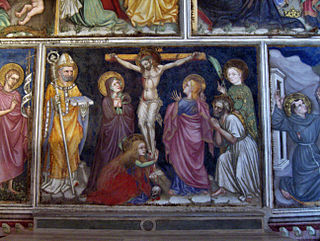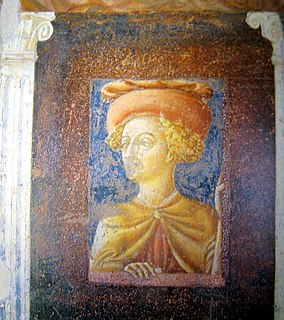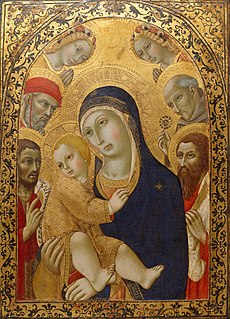Year 1306 (MCCCVI) was a common year starting on Saturday of the Julian calendar.

The Sienese School of painting flourished in Siena, Italy, between the 13th and 15th centuries. Its most important artists include Duccio, whose work shows Byzantine influence, his pupil Simone Martini, the brothers Pietro and Ambrogio Lorenzetti and Domenico and Taddeo di Bartolo, Sassetta, and Matteo di Giovanni.

Jacopo De Fazio, best known as the blessed Jacobus da Varagine, or in Latin Voragine was an Italian chronicler and archbishop of Genoa. He was the author, or more accurately the compiler, of Legenda Aurea, the Golden Legend, a collection of the legendary lives of the greater saints of the medieval church that was one of the most popular religious works of the Middle Ages.

Bernardino of Siena was an Italian priest and Franciscan missionary. He was a systematizer of Scholastic economics. His popular preaching made him famous during his own lifetime because it was frequently directed against sorcery, gambling, infanticide, witchcraft, sodomy, Jews, and usury. Bernardino was later canonised by the Catholic Church as a saint - where he is also referred to as “the Apostle of Italy” - for his efforts to revive the country's Catholic faith during the 15th century.

Lorenzo di Pietro, known as Vecchietta, was an Italian Sienese School painter, sculptor, goldsmith and architect of the Renaissance. He is among the artists profiled in Vasari's Le Vite delle più eccellenti pittori, scultori, ed architettori.

Anne-Hilarion de Costentin, Comte de Tourville was a French naval commander who served under King Louis XIV. He was made Marshal of France in 1693.

Pintoricchio or Pinturicchio whose birth name was Bernardino di Betto, also known as Benetto di Biagio or Sordicchio, was an Italian painter during the Renaissance. Born in Perugia in 1454 and dying in Siena in 1513, Pintoricchio acquired his nickname, meaning, because of his small stature. He also used it to sign some of his 15th and 16th century artworks.

Domenico di Pace Beccafumi was an Italian Renaissance-Mannerist painter active predominantly in Siena. He is considered one of the last undiluted representatives of the Sienese school of painting.

The brown booby is a large seabird of the booby family, Sulidae, of which it is perhaps the most common and widespread species. It has a pantropical range, which overlaps with that of other booby species. The gregarious brown booby commutes and forages at low height over inshore waters. Flocks plunge-dive to take small fish, especially when these are driven near the surface by their predators. They only nest on the ground, and roost on solid objects rather than the water surface.

The Battle of San Romano was fought on June 1, 1432, in San Romano, some 30 miles outside Florence, between the troops of Florence, commanded by Niccolò da Tolentino, and Siena, under Francesco Piccinino. The outcome is generally considered favourable to the Florentines, but in the Sienese chronicles it was considered a victory. As the 1430s began Florence had found itself in conflict with the rival city state of Lucca, and her allies, Siena and Milan.

Maria Helena Vieira da Silva was a Portuguese abstract painter. She was considered a leading member of the European abstract expressionism movement known as Art Informel. Her works feature complex interiors and city views using lines that explore space and perspective. She also worked in tapestry and stained glass.

Giovanni di Paolo di Grazia was an Italian painter, working primarily in Siena, becoming a prolific painter and illustrator of manuscripts, including Dante's texts. He was one of the most important painters of the 15th century Sienese School. His early works show the influence of earlier Sienese masters, but his later style was more individual, characterized by cold, harsh colours and elongated forms. His style also took on the influence of International Gothic artists such as Gentile da Fabriano. Many of his works have an unusual dreamlike atmosphere, such as the surrealistic Miracle of St. Nicholas of Tolentino painted about 1455 and now housed in the Philadelphia Museum of Art, while his last works, particularly Last Judgment, Heaven, and Hell from about 1465 and Assumption painted in 1475, both at Pinacoteca Nazionale (Siena), are grotesque treatments of their lofty subjects. Giovanni's reputation declined after his death but was revived in the 20th century.

Francesco di Giorgio Martini (1439–1501) was an Italian architect, engineer, painter, sculptor, and writer. As a painter, he belonged to the Sienese School. He was considered a visionary architectural theorist—in Nikolaus Pevsner's terms: "one of the most interesting later Quattrocento architects". As a military engineer, he executed architectural designs and sculptural projects and built almost seventy fortifications for the Federico da Montefeltro, Count of Urbino, building city walls and early examples of star-shaped fortifications.

Sano di Pietro or Ansano di Pietro di Mencio (1406–1481) was an Italian painter of the Sienese school of painting. He was active for about half a century during the Quattrocento period, and his contemporaries included Giovanni di Paolo and Sassetta.

Neroccio di Bartolomeo de' Landi (1447–1500) was an Italian painter and sculptor of the early-Renaissance or Quattrocento period in Siena.

The Master of the Osservanza Triptych, also known as the Osservanza Master and as the Master of Osservanza, is the name given to an Italian painter of the Sienese School active about 1430 to 1450.

The Pinacoteca Nazionale is a national museum in Siena, Tuscany, Italy. Inaugurated in 1932, it houses especially late medieval and Renaissance paintings from Italian artists. It is housed in the Brigidi and Buonsignori palaces in the city's center: the former, built in the 14th century, it is traditionally identified as the Pannocchieschi family's residence. The Palazzo Bichi-Buonsignori, although built in the 15th century, has a 19th-century neo-medieval façade based on the city's Palazzo Pubblico.

Madonna and Child with St. John the Baptist and St. Mary Magdalene is a painting by Neroccio di Bartolomeo de' Landi. The painting is a tempera on wood from 1495. It is currently held by the Indianapolis Museum of Art.
Sienne may refer to the following:

Enzo Carli was an Italian art historian.


















